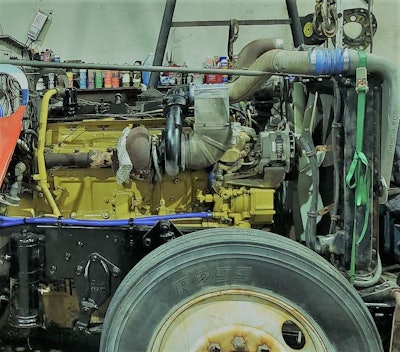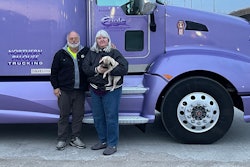 Big-ticket improvements present a variety of options as it relates to tax strategy around expensing and depreciation. Depending on your income situation, you may be well served by spreading deductions out over the next years. This can be done with depreciation scheduling, using Section 179 to expense some or all of the cost now, and/or indeed a combination of the two. Now's the time to sit down and evaluate with your accountant.
Big-ticket improvements present a variety of options as it relates to tax strategy around expensing and depreciation. Depending on your income situation, you may be well served by spreading deductions out over the next years. This can be done with depreciation scheduling, using Section 179 to expense some or all of the cost now, and/or indeed a combination of the two. Now's the time to sit down and evaluate with your accountant.
Tax season is nearly upon us. Most owner-operators are no doubt already in the thick of it, gathering information and documentation and mulling over choices with tax advisers and accountants.
One of those decisions: How to treat large expenditures on truck or trailer equipment that are depreciable. Every owner-operator no doubt knows a truck or trailer purchase is seen generally as a asset that depreciates (for tax purposes, trucks generally on a three-year depreciation schedule, trailers on a five-year). Many new owners and others, though, might not realize that large repairs/rebuilds/component replacements on either piece of equipment can be treated just like the assets themselves and thus depreciated -- with deductions taken over years. Generally, improvements to a piece of depreciable property are depreciated on the same schedule length as the base property itself (three years for trucks, five for trailers).

The de minimis safe harbor provision of the tax code allows a business to simply expense such improvements up to the $2,500 level, but you don't have to take that route. This covers rebuilt transmissions or engines or other big-ticket, non-wear items. (None of this applies to tires, for instance.)
Depending on your tax and income situation following this difficult, have-and-have-not year for so many, and your expectations for growth, consider the benefits of depreciation. It can allow a measure of control over the amount of your deductions year to year that could maximize deductions over time.
In today's world, you can, of course, take the opposite tack.
Tax Manager Michael Schneider of ATBS notes that there are two routes toward full deduction of even a truck purchase. Current IRS Section 179 limits allow for immediate expensing of up to more than a million in equipment purchases, with the limitation that “you can’t Section 179 into a loss,” he said. The benefit stops once you've zeroed out income.
Bonus depreciation, though, put in place by the Tax Cuts & Jobs Act of a couple years ago in efforts to stimulate the economy, allows you to go into that negative territory through tax year 2022. That means you could show a loss and thus negative income, and no taxes. Using bonus depreciation, you deduct 100 percent of the purchase amount in the first year. Section 179 expensing allows you to choose just how much to expense for that first year, after which you depreciate the rest over the next years. That can make the latter quite a useful tool for long-term tax reduction by smoothing out tax levels over time.
ATBS Entity Services Manager David Campos said most of his owner-operator clientele tend to focus solely on the right now when it comes to tax savings. And too many “would all just love to take the [100%] expense route and have the lowest taxes ever” during a year with a lot of qualifying repairs or refurbishments, or purchases. “We never recommend that – we recommend their income tax staying at a level within the 10 percent bracket.”
There is, however, a sort of "slam dunk" way to use Section 179 or bonus depreciation, said Schneider, offering the situation of an owner-operator and spouse filing jointly. The spouse makes so much money that it looks like the pair are going to jump into the next tax bracket and pay more than 20% in income tax. “You can use [Section 179 or] bonus depreciation to position yourselves into that 10 percent tax bracket.”
Usually, though, zeroing out your income by gorging on expense deductions is a short-sighted strategy -- you’re missing out on other qualifying deductions, Schneider pointed out, which you'll never get back. “The Tax Cuts & Jobs Act doubled the standard deduction for all taxpayers. If your only source of income is your Schedule C and you’re going to use accelerated depreciation to reduce [income] to zero, you’re leaving the standard deduction on the table.”
If you have some taxable income, thus, he added, “that’s a good thing.” When you show zero income, Schneider said, you’ve also hamstrung yourself as it relates to future Social Security benefits, which takes earnings into account. Low income on a lot of revenue raises the likelihood of an audit, too.
At the same time, by not deducting all of the investment’s cost in that first year, you can “save that depreciation for future years when you’ll hopefully have more earnings and taxable income,” he added.
When it comes to the politics of taxes, while nothing is clear at this moment, the Biden administration, by some views, has signaled a willingness to pursue tax-code changes of various stripes. Saving your deductions for future use with a depreciation schedule thus might help you offset some of those changes if they fall in the higher taxes column.
What's your approach to depreciable expenses this year? Drop a comment with your strategy.
You can of course find more information about taxes, truck purchasing and more in the updated 2022 edition of Overdrive’s Partners in Business manual for owner-operators and prospective owner-ops, available for download via the link.











